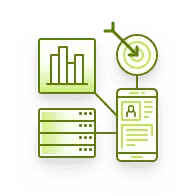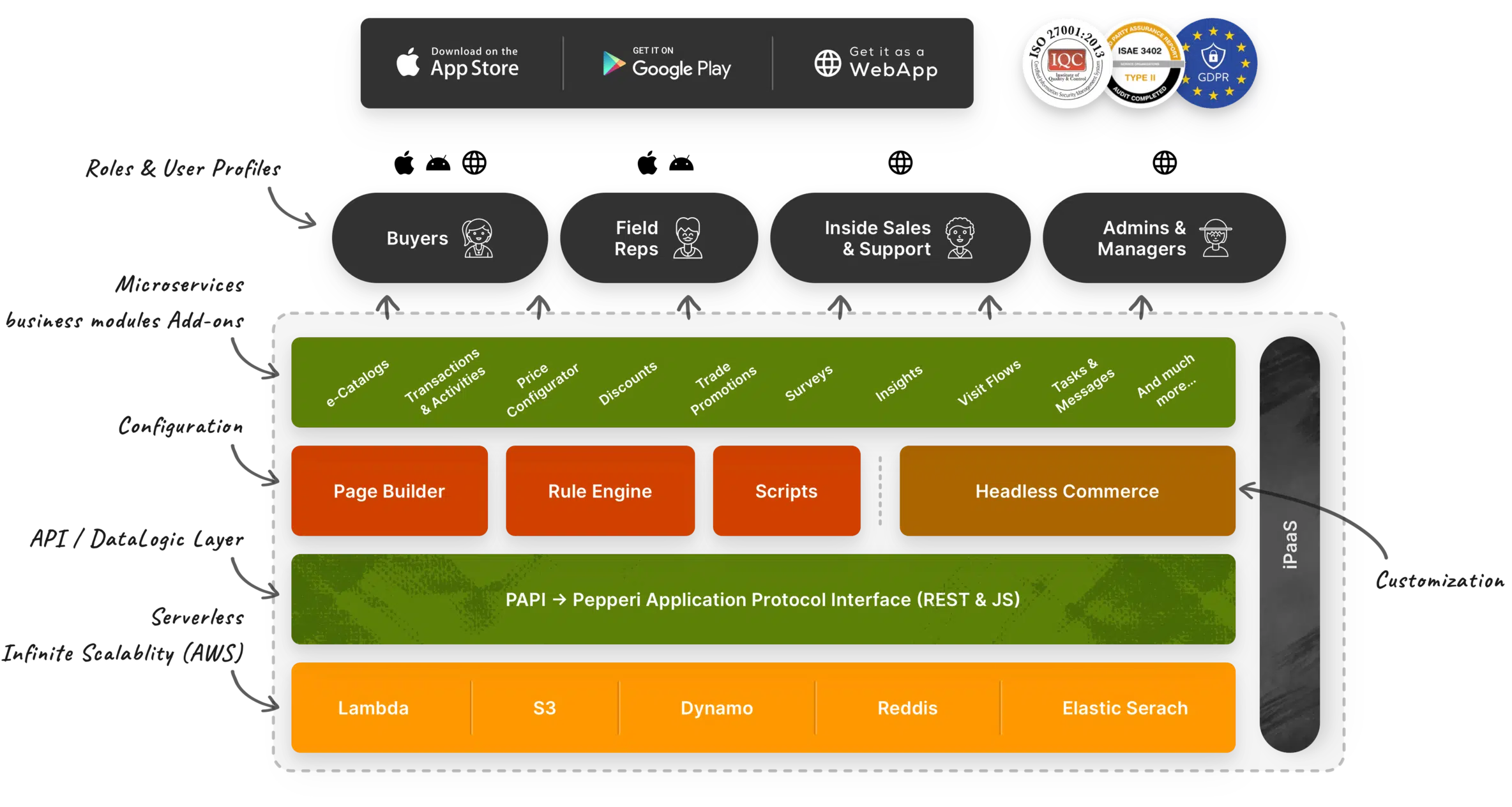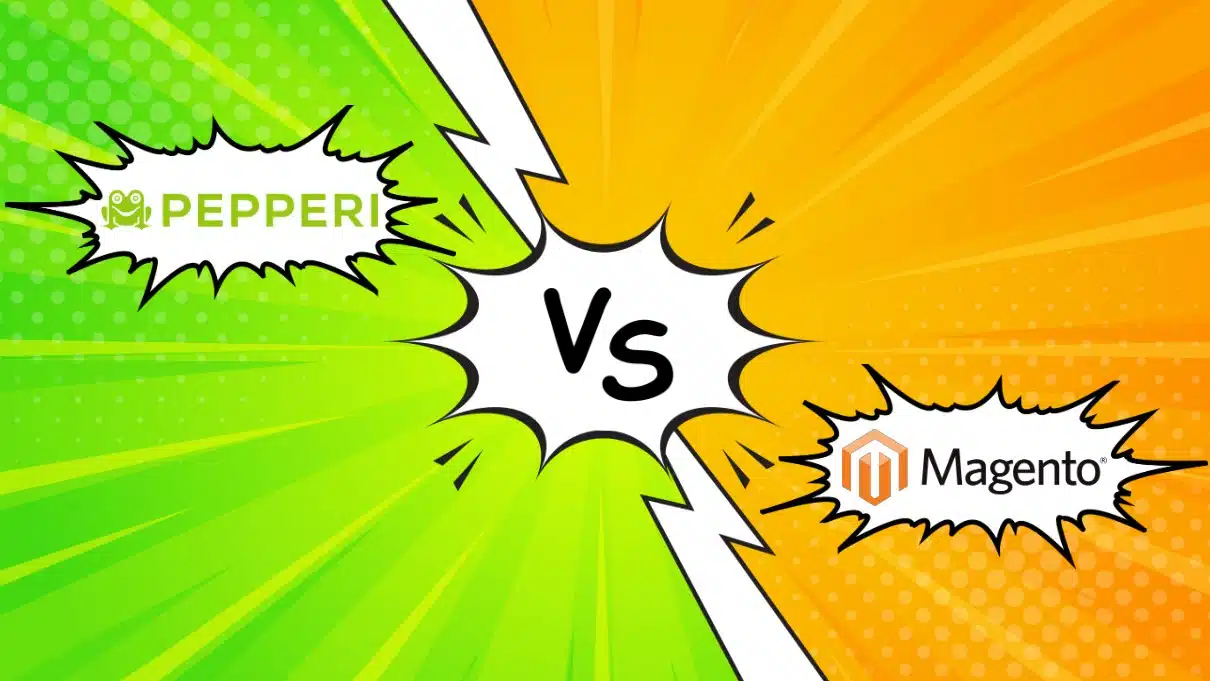Why Unified B2B Commerce is Hard to Achieve in the FMCG Industry
February 28, 2023 By Yana Persky

- The challenges faced by the Fast-Moving Consumer Goods (FMCG) industry when trying to implement a unified B2B commerce approach.
- You will learn about the fragmented nature of FMCG wholesaling and the obstacles this creates for creating a single, cohesive platform.
- You wil be introduced to the concept of unified commerce and explore how Pepperi, an integrated platform can streamline operations and improve data exchange across stakeholders, leading to better customer insights and improved efficiency.
Fast Moving Consumer Goods (FMCG) is one of the most competitive and dynamic industries in the B2B distribution space. It’s also one of the most challenging when it comes to achieving unified B2B commerce.
In today’s FMCG market, the need for unified B2B commerce is becoming increasingly important. It enables companies to unify their front-end channels and backend systems into one single platform, while using the same business logic. However, achieving this is easier said than done.
From needing an online/offline web and native mobile app for field sales, to difficulties with data integration, this blog post will explore the obstacles blocking the FMCG industry from implementing a unified B2B commerce approach.
Pro Tip: To overcome the fragmented nature of the FMCG industry, companies should invest in modern, flexible technology that can integrate multiple sales channels into a single platform. This will provide greater operational efficiency and improve data flow across the business.
Fragmented Nature of the FMCG Wholesaling
The FMCG industry is highly fragmented, with many wholesalers selling different types of goods. This makes it difficult to create a unified commerce solution that is tailored to the needs of each individual wholesaler.
Each wholesaler has its own way of doing business, and often has multiple solutions – such as B2B ecommerce, mobile order taking, route accounting/direct store delivery, inside sales, trade promotions, retail execution and mobile CRM. These solutions are often sourced by different providers, making it more difficult for FMCG distributors to implement a single unified platform.
Another issue is that the FMCG industry is highly competitive, with companies constantly trying to ‘out-innovate’ each other. This means that companies often have to invest in custom solutions that may not be compatible with other companies’ systems. This further complicates the process of moving to a unified commerce platform.
Finally, FMCG wholesalers need to be able to respond quickly to changing market conditions and customer demands. This requires them to be agile – to be able to quickly make changes to their systems and processes. Unfortunately, existing unified B2B commerce solutions are not built with this level of flexibility in mind and therefore are not able to meet the needs of the FMCG industry.
Pro Tip: To support field sales teams effectively, choose mobile apps that function both online and offline. This ensures that sales reps can always access customer data, place orders, and make decisions, even in areas with limited internet connectivity.
Lack of Interoperability Between Systems
As FMCG wholesalers developed and grew, many came to the conclusion that relying on multiple sales channels was unsustainable. They required a better approach to oversee their sales operations, and this is how “omnichannel” was born.
The concept behind omnichannel was to develop an integrated system that would link together all of a business’s various sales channels onto a single platform. Customers would be able to communicate with the company more easily as a result, and the expenses related to managing various platforms would go down. Unfortunately, this goal of integrating multiple channels failed.
The primary reason for this failure was the lack of interoperability between systems. There are a number of legacy systems in place across different sectors of the industry, and they often don’t work well with each other. This lack of integration means that it can be difficult to exchange data across different business units, leading to a lack of visibility and control over the entire FMCG supply chain. This leads to inefficiencies, missed opportunities and poor customer service.
Online/Offline Native Mobile App
Unlike other industries, FMCG distributors heavily rely on an efficient and effective sales force. Field sales teams play a crucial role by ensuring that products are ordered and delivered on time, and that customers receive the best possible service.
FMCG companies too often blame their field reps for underperforming. However, it’s not the reps who are failing, but the companies who are failing to manage them effectively. How are reps being supported? What steps are being taken to help them succeed? How can sales reps be expected to make their quotas if they are unable to process orders captured in the field? How can reps make data-driven decisions in the field and access all their back-office information with a slow, or even no internet connection?
For wholesale distributors and manufacturers, mobile technology has introduced opportunities for sales innovation and differentiation. However, using native apps and storing app data on the device are necessary but insufficient measures. A sales force automation app needs to have local, device-side logic to enable reps to work autonomously offline. Even in areas where data connectivity is widely available, your field reps constantly transition from online to offline.
Pro Tip: To create a unified B2B commerce platform, prioritize seamless data integration between various systems. This will reduce inefficiencies and provide real-time insights into customer behavior and inventory, enabling more informed business decisions.
Online/Offline – All information is available to sales reps in the field, including order taking, on-the-go insights about each client, and easy follow up of order status and stock levels. Synchronization occurs automatically in the background as soon as a connection is re-established. The process handles backend and client conflicts with minimal business interruptions, prompting for user intervention only when necessary.
The best mobile sales apps work both online and offline. Offline mode means no downtime – ever. With a native mobile eCommerce app that is fully functional in offline mode, FMCG field sales reps will be able to serve their customers anywhere, at anytime, directly from their mobile phone or tablet, and never miss an opportunity to sell.
Conclusion
Achieving unified B2B commerce in the FMCG wholesale industry requires an integrated platform that allows for easy data exchange between all the different stakeholders. Unfortunately, most of the existing unified B2B commerce platforms are outdated, inflexible and lack the ability to work without an internet connection, making it hard to build a seamless, interconnected ecosystem.
To truly achieve unified commerce, companies must invest in modern, robust technology solutions that enable them to unite all their front-end sales channels and back-end systems in a single, comprehensive platform. This type of system provides FMCG distributors with a centralized view of customer data, allowing them to better understand customer behavior and preferences.
Pro Tip: Streamline operations with a centralized platform like Pepperi, which offers B2B e-commerce, mobile order-taking, DSD, and more in one integrated solution. This will reduce costs and enhance the customer experience with a personalized and efficient approach.
With Pepperi unified commerce, they can streamline their operations and reduce costs while providing customers with an efficient and personalized shopping experience.
Check out Pepperi’s all-in-one, out of the box platform for B2B eCommerce, mobile order taking, DSD, and more!
Key Takeaways
- Many FMCG companies face challenges in integrating legacy systems. The lack of interoperability between these systems makes it difficult to exchange data and results in inefficiencies across the supply chain, leading to poor visibility and missed opportunities.
- FMCG distributors rely heavily on field sales teams, but the existing technology often fails to support them effectively due to slow or unreliable internet connections, making it difficult to access data, place orders, and make informed decisions while in the field. Field sales teams need mobile apps that work both online and offline to ensure they can serve customers anytime and anywhere.
- To achieve true unified B2B commerce, FMCG companies need a platform that integrates both front-end and back-end systems. This platform should facilitate seamless data exchange and provide a centralized view of customer behavior, improving customer relationships and operational efficiency.
- With the use of Pepperi’s unified commerce platform a comprehensive solution for B2B e-commerce, mobile order taking, and direct store delivery (DSD) is achieved. Helping FMCG companies streamline their operations and improve customer experiences.


























